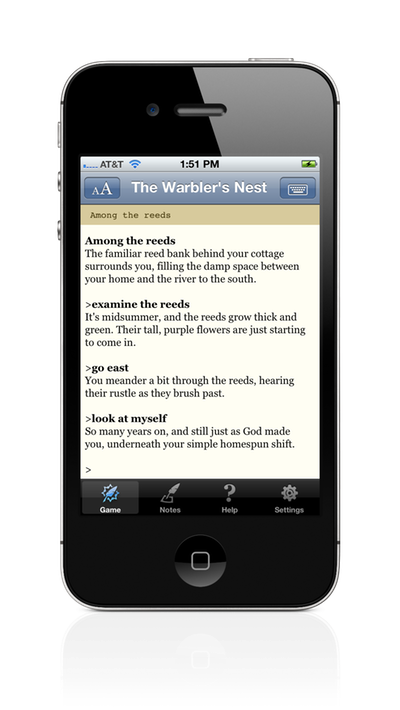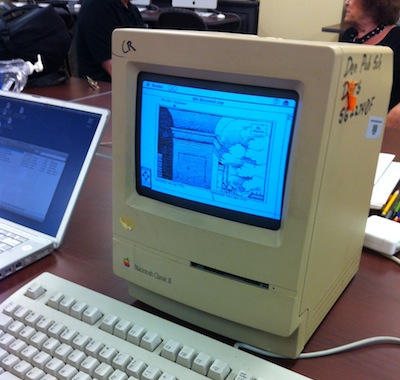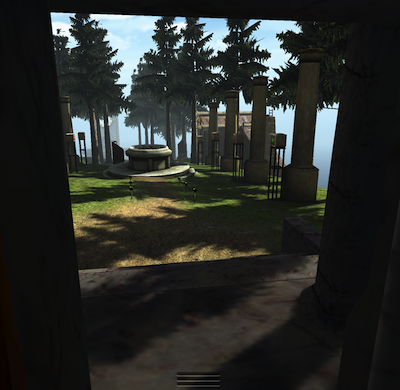Monthly Archives: June 2012
If I want to call this the "June report", I'd better get it posted in the next couple of hours... That is, if you're in the US. Everyone else can blame the leap-second.
Last month, I was saying I had a complete picture of the puzzle structure. I can now add to that:
- An update of PlotEx which can handle the puzzle structure. (I wasn't kidding about it needing optimization, woo boy.)
- A map! (Not complete in detail -- I may split up some rooms and shift closets around -- but complete in structure.)
- A rough list of where everything in the game belongs on the map. (Again, not yet fixed in terms of what goes in what closet.)
- The basic Inform code for the ritual engine.
- The first three rituals.
- A unit-testing script for testing new rituals as I implement them.
- A Secret Project.
Tags: dreamhold, if, interactive fiction, the warbler's nest, zarf, zarfplan.
If you, like me, hadn’t paid much attention to Indie Game: The Movie because it doesn’t have a very strong title, let me assure you that it’s a poor match for what turns out to be a really impressive documentary with a focused and strong narrative. It’s available digitally via various channels (I rented it on iTunes), and I highly recommend forgiving it for keeping its working title.
Tags: movies.
(but was afraid to ask)
The first session I dropped into at the ELO Conference was the "Archiving Workshop". The eye candy here is Bill Bly's hypertext piece We Descend, running on the Mac Classic platform that he originally started writing it on. (That's System 6-point-something, I believe.) Enjoy the pixelly nostalgia!
The point, of course, is that getting data off of such antique equipment is a permanent and increasing headache. (This Mac was borrowed from a library, so Bly had the equal headache of trying to get the app onto it from his much newer Mac laptop.) The piece was originally written with a proprietary tool, Storyspace -- an old version which is no longer supported on current OSes. (He has since updated the project to the current, but still proprietary, Storyspace 2.)
The whole notion of archiving and replaying digital art (and games, etc) is rife with these issues. See, for example, the ELO's 2004 publication titled Acid-Free Bits.
The session turned into a lively roundtable discussion, and in the course of that, I popped in a mention of the IF Archive. I knew our community is pretty good about that stuff -- I've always been proud of it, and to be part of it -- but I was startled when some of the other participants vociferously lionized us for it. "The IF community is the gold standard for archiving!" Exact quote. Yikes!
(Apologies, by the way: I'm not going to even try to remember everybody's name. This post will be all "somebody" and "that guy". Feel free to comment and fill in blanks.)
The discussion alternately surprised and startled me with the different assumptions that people had about archiving. Like, for example, everybody thought this was a hard problem and the IF people had done something very difficult in solving it. "It's a distributed, mirrored archive containing every IF game ever created. When you put it that way, it does sound kind of impressive!"
Okay, that was Aaron Reed who said that. I know his name. But point taken.
Let me try to tease out some of those assumptions, what turns out to be easy, and what's probably more difficult than it looks. I will do this in the best way: with a set of Taoist aphorisms!
Tags: archiving, ELO, ifarchive, javascript.
![]() I am pleased to follow up with my last app-release announcement post to announce another app I made. This one is Hero Tracker, a player aid for Hero Academy — which, yes, is the subject of the post before that.
I am pleased to follow up with my last app-release announcement post to announce another app I made. This one is Hero Tracker, a player aid for Hero Academy — which, yes, is the subject of the post before that.
The timing catches me a little by surprise because the app spent a couple of extra weeks in limbo while Apple tut-tutted and waited for me to secure permission from Robot Entertainment to make use of their game’s name and art assets like this. But I did, and the app spontaneously went live late last night, a few days after I forwarded Robot’s acknowledgment to the opaque machine of switches, pulleys, regular expressions and interns that manage the App Store’s approval system.
As its description on the App Store states, Hero Tracker is a free, simple tool for iPhone and iPod Touch that lets players track the progress of their active games, mainly to note which pieces have been played by either side. I admit that if someone were to pull something like this out during a face-to-face strategy game I’d look at them funny, but since turns in Hero Academy might be days apart, I feel no qualms about using a memory aid like this with it.
That counts N-ple when one is playing several games in parallel, a situation which Hero Tracker handles gracefully. So now I can remind myself with certainty that the Council player who finally took their turn after a fortnight is out of Inferno spells but still has one high-powered Cleric in reserve. I can calculate the chance that that Cleric sits on their rack, ready to deploy next turn, and plan my own move accordingly.
Tags: apple, hero academy, ios.
 I am pleased to announce the release of my interactive short story The Warbler’s Nest for iPhone, iPad, and iPod Touch. You can find it in the App Store for 99 cents American (or your local equivalent thereof). The original, free web edition of the game remains playable, but this native app brings enough unique and lovely features specific to a touch-based and text-philic platform that I hope you’ll find it worth your dollar.
I am pleased to announce the release of my interactive short story The Warbler’s Nest for iPhone, iPad, and iPod Touch. You can find it in the App Store for 99 cents American (or your local equivalent thereof). The original, free web edition of the game remains playable, but this native app brings enough unique and lovely features specific to a touch-based and text-philic platform that I hope you’ll find it worth your dollar.
It comes to you by way of Zarf’s iOS Fizmo, the open-source framework he released to the world in May as a milestone of the Hadean Lands project. I ship this new edition of Warbler in a similar spirit to Zarf’s re-release of 2004’s The Dreamhold alongside iOS Fizmo. Much as that game served as a reference implementation of sorts for the new framework, I hope mine to act as an early test case of selling modern interactive fiction on contemporary, touch-driven platforms.
I hope you have the chance to play and enjoy the game in this new format. If you do, then I would be thrilled and humbled were you to leave a brief review in the App Store as well.
Tags: if, interactive fiction, ios, text, the warbler's nest.
Robot Entertainment’s Hero Academy is my favorite new videogame of 2012, and far and away the best original-to-platform tabletop game I have enjoyed on iOS. I have felt more intense highs and lows playing this strictly player-versus-player game than any other videogame of the last year, to the point where it rekindles my interest in tablet games and their potential for great multiplayer experiences. Beyond that, I admire the publisher’s sales approach, and hope that it becomes a model for other game studios to follow.
On reflection, the fiero that fills me when a Hero Academy sally goes well (and the hunger for same I feel when things go badly) is identical to the thrill of a face-to-face boardgame that’s really engaged my attention. I credit this to Hero Academy’s various smart design nudges that make starting (and, subsequently, managing) games with real-live opponents a pleasure, doing it better than any cardboard-to-digital adaptation I’ve seen so far. It helps remind me why I tend to treasure my experiences with great multiplayer games far more than any solitaire game.
Tags: hero academy, ios, ipad.
As promised, Cyan's port of RealMyst for iPad has just hit the iOS App Store.
It requires an iPad 2 or the new (third-gen) iPad. Cyan's original promos also promised support for the newest iPhone, but apparently they couldn't make that work, because it ain't there. The planned price is ten bucks, but they're doing a launch sale at seven. So snag it now, if you're into buying Myst a lot. (We recall that the original flat-image Myst appeared for iPhone/iPad in 2009.)
It's very pretty -- of course; albeit with the slightly simplified RealMyst world. (The original Myst allowed arbitrarily detailed images, but a 3D engine has to count polygons.) This is probably at the limit of what the newest iPad can handle. Load times between Ages are pretty awful, and even moving between rooms induces a second or two of delay to load new textures. However, that aside, walking and looking around are quite smooth. The skies and ripple-animated water look fantastic. The only missing graphical element (so I am told) is the day-night lighting cycle in some of the Ages.
(And, may I say, the new iPad has a fantastic display. Go ahead, click through to the full-sized screenshot. 2048x1536, baby, and you can just spin around like an acrobat.)
As my loyal followers know, I released Dreamhold on a Friday, and then spent most of Saturday trying to figure out why it was crashing for some players. Nobody ever wants a software release like that, but I did find the bug, so it's as much of a win as one can hope for. The bug fix just hit the App Store.
I thought it might be interesting to detail the whole sequence of events. Or maybe it'll be as dull as ditch dirt! I don't know. It seems like a good narrative to me, but I was dere, Charlie.
Tags: buffer overflow, bugs, dreamhold, programming, tldr.



